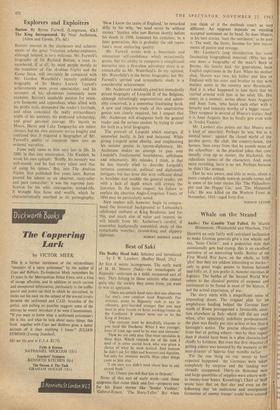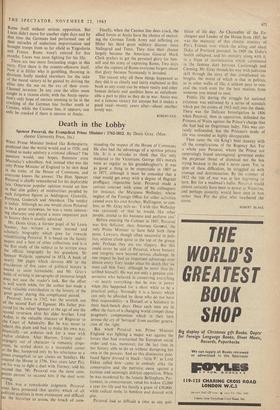Whale on the Strand
Anzio : The Gamble That Failed. By Martin Blurnenson. (Weidenfeld and Nicolson, 25s.) DESPITE an only fairly well restrained inclination to make German generals give a low whistle and say, 'Jesus Christ!', and a pedestrian style that occasionally gets bad cramp, this is an excellent narrative of an interesting battle. Battles of the First World War have, on the whole, so little `plot' that they are seldom interesting as stories— only as great tragic poems to human heroism
and folly, or, if you prefer it, monster exercises in logistics. The battles of the Second World War return to the classical pattern of suspense and excitement to be found in most of the history, if not the actual experience, of war.
The story starts with a magnificent sense of impending doom. The original plan for an
amphibious landing behind the German lines south of Rome presupposed a favourable situa- tion elsewhere in Italy which still did not exist when, after apparently indefinite postponement, the plan was finally put into action at less than a fortnight's notice. The precise objective—apart,01 from that of getting ashore—was by then vaguer j than it should have been in a plan characterised ' chiefly by boldness. But even that first objective of getting ashore was haunted by the memory of the near-disaster of Salerno four months earlier.
Yet the one thing no one seems to have, expected happened : the Germans were taken completely by surprise and the landing was virtually unopposed. Thirty-six thousand men and large quantities of supplies were ashore with- in twenty-four hours. Kesselring's Chief of Staff wrote later that on that day and even on the following day 'an audacious and enterprising formation of enemy troops' could have entered
Rome itself without serious opposition. But Lucas didn't move for another eight days and by that time the Germans had performed one of their miracles of audacious improvisation and brought troops from as far afield as Yugoslavia and France. Rome wasn't entered for five months. Lucas was soon fighting for his life.
There are two more fascinating stages in this story. First there is the counter-offensive itself. Now it is Hitler who is gambling, throwing in divisions badly needed elsewhere for the sake of the moral victory tobe gained by driving the allies into the sea on the evz of their cross- Channel invasion. In any case the allies seem caught in a vicious circle, with the Anzio opera- tion's only hope of success seeming to lie in the cracking of the German line further south at Cassino, while the Cassino line, it appears, can only be cracked if there is success at Anzio. Finally, when the Cassino line does crack, the allied forces at Anzio have the chance of encircl- ing the German Tenth Army and inflicting on Hitler his third great military disaster since Stalingrad and Tunis. They miss their chance largely because the American General Mark Clark prefers to get the personal glory for him- self and his army of capturing Rome, Two days after the capture of Rome everyone forgets about that glory because Normandy is invaded.
The reason why all these things happened as they did is as clearly and fairly explained in this book as any event can be where vanity and other human defects and qualities have as unfathom- able a part to play as they do in war. Anzio was not a famous victory for anyone but it makes a good read—twenty years after—about another lovely war.
ROBERT KEE



































 Previous page
Previous page